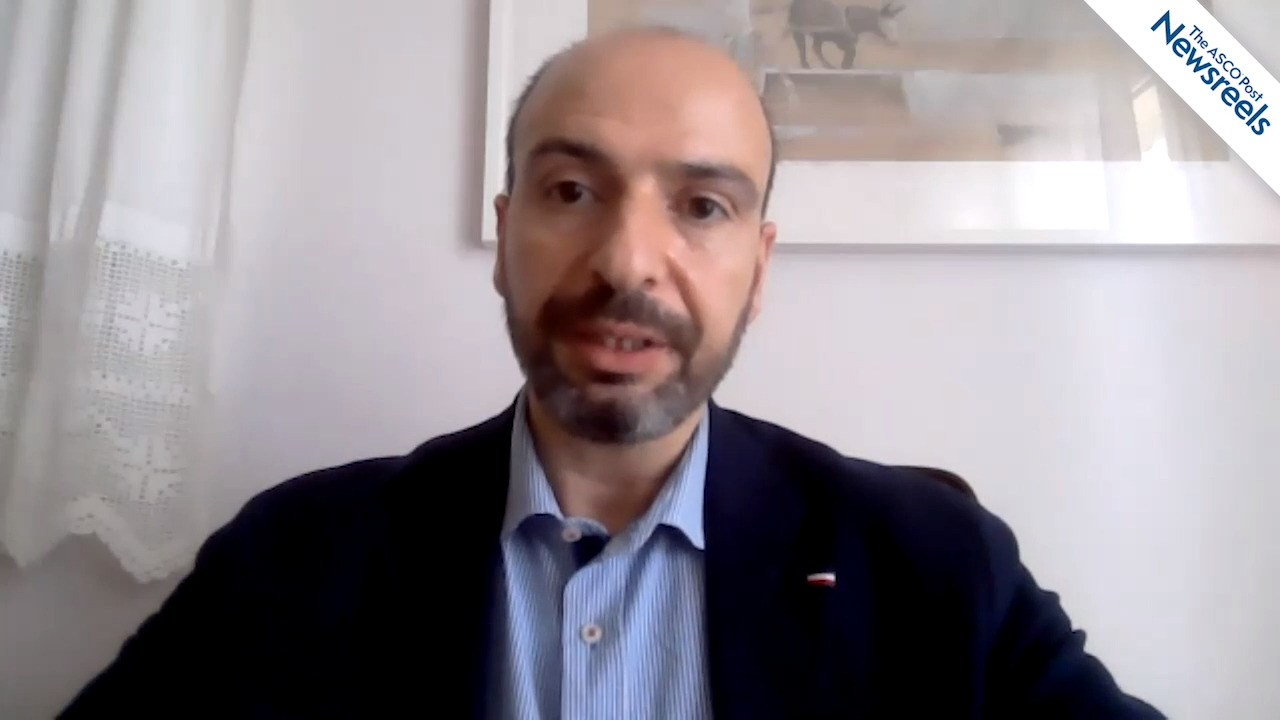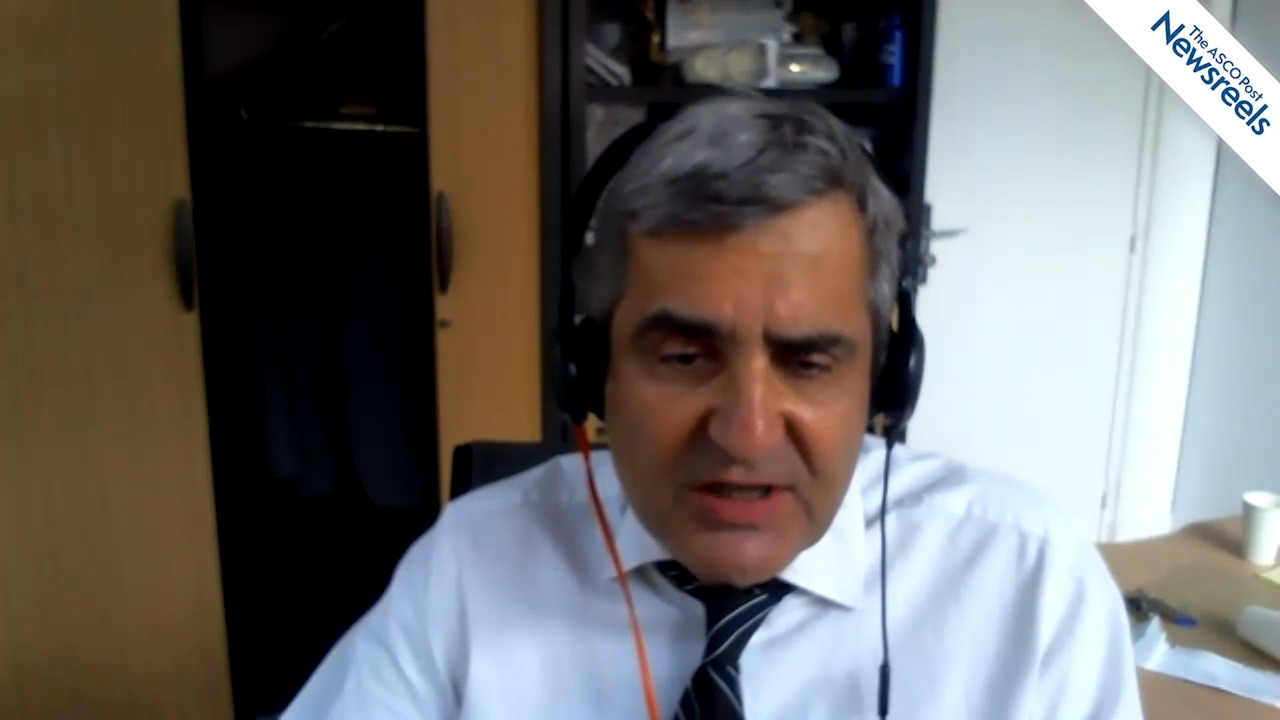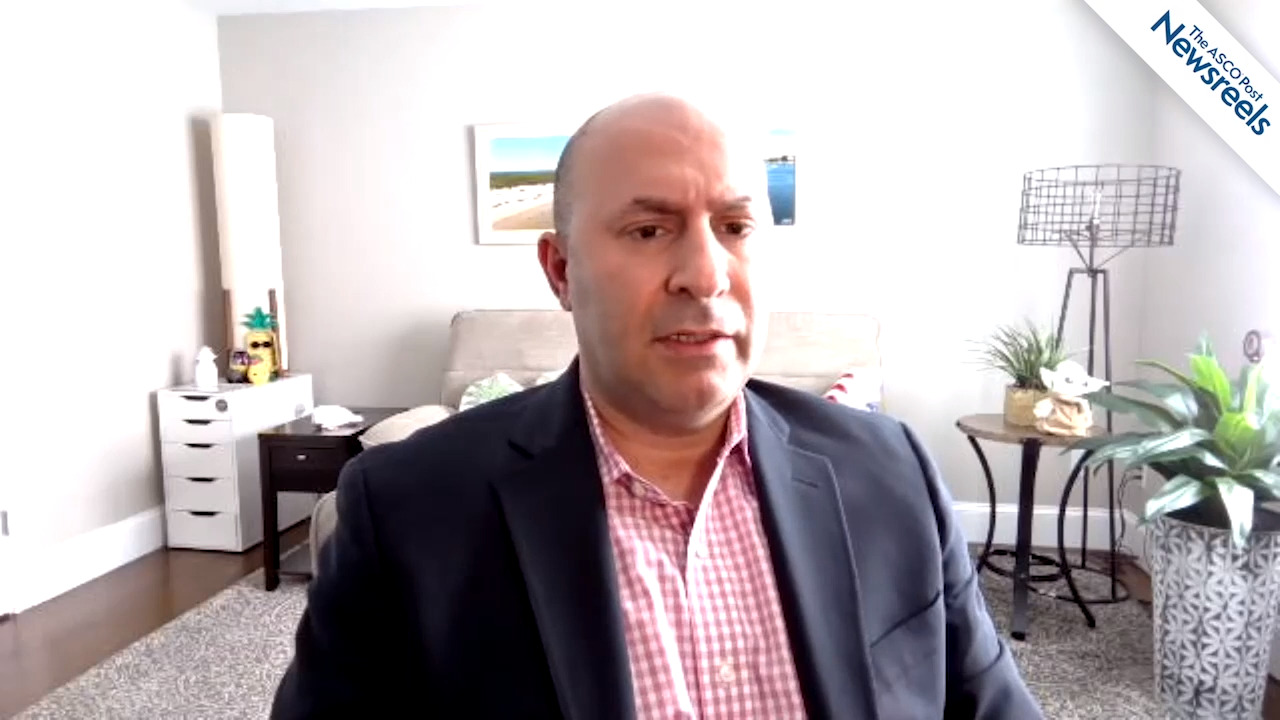Efstathios Kastritis, MD, on Amyloidosis: Standard of Care Plus Daratumumab
Efstathios Kastritis, MD, of the University of Athens, discusses updated phase III results from the ANDROMEDA study of patients with newly diagnosed light chain amyloidosis. The trial further supports the use of daratumumab plus VCd (bortezomib, cyclophosphamide, and dexamethasone), which was shown to be clinically superior to VCd alone (Abstract S189).
Axicabtagene Ciloleucel Demonstrates Improvement Across Multiple Endpoints in Relapsed or Refractory Follicular Lymphoma
In the treatment of relapsed/refractory follicular lymphoma, a comparison of data from the ZUMA-5 trial with those of the external control cohort of the SCHOLAR-5 trial showed substantial improvement in all clinical endpoints with axicabtagene ciloleucel. John G. Gribben, DSc, FRCP, FRCPath,...
Nicholas J. Short, MD, on ALL: Ponatinib Plus Blinatumomab May Help Patients Avoid Transplants
Nicholas J. Short, MD, of The University of Texas MD Anderson Cancer Center, discusses early results from a phase II study which showed that combining ponatinib and blinatumomab in patients with Philadelphia chromosome–positive acute lymphoblastic leukemia may prove to be an effective chemotherapy-free regimen that might reduce the need for allogeneic hematopoietic stem cell transplant (Abstract 7001).
Overall Survival Benefit With Upfront Daratumumab Plus Lenalidomide/Dexamethasone for Newly Diagnosed Transplant-Ineligible Patients With Multiple Myeloma
In an updated analysis of the phase III MAIA trial, the addition of daratumumab to lenalidomide and dexamethasone resulted in a statistically significant overall survival benefit over lenalidomide/dexamethasone alone in patients with newly diagnosed multiple myeloma who are ineligible for...
Expert Point of View: Mansoor Raza Mirza, MD
The invited discussant of EMPOWER-Cervical 1 was Mansoor Raza Mirza, MD, Chief Oncologist at Copenhagen University Hospital and Chairman of the European Network of Gynaecological Oncology Trials group (ENGOT). Dr. Mirza called the findings “amazing” and predicted they will “usher in a new era” in...
Immunotherapy With Cemiplimab-rwlc Yields Survival Benefit in Advanced Cervical Cancer
The PD-L1 inhibitor cemiplimab-rwlc has become the first immunotherapy to yield a statistically significant and clinically meaningful survival benefit in recurrent or metastatic cervical cancer progressing after first-line platinum-containing chemotherapy. Patients were enrolled irrespective of...
Adjuvant Trastuzumab Emtansine vs Paclitaxel/Trastuzumab in Stage I HER2-Positive Breast Cancer
In the phase II ATEMPT trial reported in the Journal of Clinical Oncology, Sara M. Tolaney, MD, MPH, and colleagues found that adjuvant trastuzumab emtansine (T-DM1) resulted in “excellent” invasive disease–free survival but did not reduce clinically relevant toxicity compared with...
Patient-Reported Outcomes From the IMbrave150 Trial in Advanced Hepatocellular Carcinoma
In an analysis from the phase III IMbrave150 trial reported in The Lancet Oncology, Peter R. Galle, MD, and colleagues found that patients receiving atezolizumab plus bevacizumab had better patient-reported outcomes vs those receiving sorafenib for advanced unresectable or metastatic hepatocellular ...
Dual Immune Checkpoint Blockade With Nivolumab and Ipilimumab for Treatment of Malignant Pleural Mesothelioma
In recent years, immune checkpoint inhibitors in the treatment of mesothelioma have been a keen area of investigation for this immunogenic solid tumor. With recent publications, principally findings from CheckMate 743 by Baas et al1 (reviewed in this issue of The ASCO Post), combination immune...
Nivolumab/Ipilimumab Improves Overall Survival vs Chemotherapy in First-Line Treatment for Unresectable Malignant Pleural Mesothelioma
As reported in The Lancet by Paul Baas, MD, of The Netherlands Cancer Institute, Amsterdam, and colleagues, a prespecified interim analysis in the phase III CheckMate 743 trial has shown improved overall survival with first-line nivolumab/ipilimumab vs platinum-based chemotherapy in unresectable...
Is High Tumor Mutational Burden Predictive of Immune Checkpoint Blockade Efficacy Across All Cancer Types?
In a letter recently published in The New England Journal of Medicine and reviewed in this issue of The ASCO Post, Rousseau and colleagues reported data on the spectrum of benefit from immune checkpoint blockade in hypermutated tumors.1 Indeed, the U.S. Food and Drug Administration (FDA) recently...
Is Tumor Mutational Burden Predictive of Survival Outcomes in Solid Tumors Treated With Immune Checkpoint Inhibitors?
In a letter to the editor in The New England Journal of Medicine, Benoit Rousseau, MD, PhD, and Michael B. Foote, MD, of Memorial Sloan Kettering Cancer Center (MSK), and colleagues presented evidence that a high tumor mutational burden (TMB) threshold of 10 alone may not be sufficient to predict...
Cabozantinib With Nivolumab for Metastatic Renal Cell Carcinoma: A New Front-Line Standard
The pace of clinical research in metastatic renal cell carcinoma is faster than ever. Over the past 5 years, we have seen data from six phase III clinical trials evaluating combination strategies with checkpoint inhibitors. The era began with data from CheckMate 214, evaluating nivolumab with...
Atezolizumab Reduces Risk of Disease Progression in Patients With PD-L1–Expressing Early-Stage NSCLC
Atezolizumab given after chemotherapy to patients with resected stage II to IIIA non–small cell lung cancer (NSCLC) significantly improved disease-free survival compared with best supportive care alone in patients whose tumors expressed PD-L1.1 These results of the global phase III IMpower010 trial ...
Cathy Eng, MD, on Colorectal Cancer: FOLFOXIRI, Cetuximab, and Bevacizumab as First-Line Treatment
Cathy Eng, MD, of Vanderbilt-Ingram Cancer Center, discusses two abstracts from a session she co-chaired: the phase II DEEPER trial, which explored the use of FOLFOXIRI plus cetuximab vs FOLFOXIRI plus bevacizumab as first-line treatment in metastatic colorectal cancer with RAS wild-type tumors; and the phase II FIRE-4.5 study, which investigated FOLFOXIRI plus either bevacizumab or cetuximab as first-line treatment of BRAF V600E–mutant advanced disease (Abstracts 3501 and 3502).
Thierry André, MD, on Pembrolizumab vs Chemotherapy in MSI-High Colorectal Cancer
Thierry André, MD, of Hôpital Saint-Antoine, discusses final overall survival data for the phase III KEYNOTE-177 study, which confirmed pembrolizumab as a new standard of care for first-line treatment of patients with microsatellite instability–high/mismatch repair–deficient metastatic colorectal cancer (Abstract 3500).
Nadia Harbeck, MD, PhD, on Early Breast Cancer: Benefit of a De-escalated Regimen
Nadia Harbeck, MD, PhD, of Ludwig Maximilian University of Munich, discusses results from the ADAPT HR–/HER2+ trial, which showed, for the first time, improved pathologic complete response and survival in patients with early breast cancer who were treated weekly with a de-escalated 12-week regimen of neoadjuvant paclitaxel plus pertuzumab and trastuzumab (Abstract 503).
APOLLO Trial: Addition of Subcutaneous Daratumumab to Pomalidomide/Dexamethasone in Previously Treated Patients With Multiple Myeloma
As reported in The Lancet Oncology by Meletios A. Dimopoulos, MD, and colleagues, the phase III APOLLO trial has shown significantly improved progression-free survival with the addition of subcutaneous daratumumab to pomalidomide/dexamethasone in patients with previously treated multiple myeloma....
KEYNOTE-361: First-Line Pembrolizumab With or Without Chemotherapy vs Chemotherapy Alone in Advanced Urothelial Carcinoma
As reported in The Lancet Oncology by Thomas Powles, MD, PhD, and colleagues, the phase III KEYNOTE-361 trial has shown no significant improvement in progression-free or overall survival with first-line pembrolizumab plus platinum-based chemotherapy vs chemotherapy alone in patients with advanced...
CheckMate 274: Adjuvant Nivolumab in High-Risk Muscle-Invasive Urothelial Carcinoma
As reported in The New England Journal of Medicine by Dean F. Bajorin, MD, and colleagues, an interim analysis of the phase III CheckMate 274 trial has shown improved disease-free survival with adjuvant nivolumab vs placebo among all patients with high-risk muscle-invasive urothelial carcinoma who...
Choice of First-Line Platinum Chemotherapy Does Not Significantly Impact Efficacy of Second-Line Immunotherapy in Advanced Urothelial Carcinoma
In a presentation of real-world data given during the 2021 ASCO Annual Meeting, Miron et al concluded that the choice of first-line platinum chemotherapy did not result in a significant difference in overall survival benefit among patients with advanced bladder cancer who were able to go on to...
ADAPT: Survival Outcomes After Neoadjuvant Dual HER2 Therapy for HR-Negative, HER2-Positive Breast Cancer
The first overall survival analysis of the WSG-ADAPT HR-/HER2+ study, which evaluated neoadjuvant therapy in patients with hormone receptor (HR)-negative, HER2-positive breast cancer, showed that treatment with pertuzumab and trastuzumab plus paclitaxel—or the chemotherapy-free regimen of...
Omid Hamid, MD, Discusses RELATIVITY-047
Omid Hamid, MD, Chief of Translational Research/Immuno-Oncology at The Angeles Clinic & Research Institute, Los Angeles, and Co-Director of the Cutaneous Malignancy Program at Cedars-Sinai Cancer Institute, shared his thoughts on the RELATIVITY-047 study1 for The ASCO Post, referring to them as ...
Targeting LAG-3 and PD-1 With Relatlimab and Nivolumab: A New Option Under Study in Advanced Melanoma
Immune checkpoint inhibition has been established as an effective treatment for patients with metastatic melanoma. A novel immunotherapeutic combination—this one targeting the LAG-3 (lymphocyte-activation gene 3) and PD-1 immune checkpoints—delayed time to disease progression significantly more...
Brian I. Rini, MD, on RCC: Pembrolizumab Plus Axitinib vs Sunitinib as First-Line Therapy
Brian I. Rini, MD, of Vanderbilt University, discusses findings from KEYNOTE-426, the longest follow-up of a checkpoint inhibitor (pembrolizumab) combined with a VEGF/VEGFR inhibitor (axitinib) for first-line clear cell renal cell carcinoma. The trial results continue to support this combination as a standard of care for patients with previously untreated disease (Abstract 4500).
No Survival Difference for Front-Line Combination Regimens in Intermediate- and Poor-Risk Clear Cell RCC: Real-World Outcomes
A large retrospective study of real-world patients with renal cell carcinoma (RCC) showed similar survival outcomes for patients with intermediate- or poor-risk disease regardless of whether they were treated with the combination of axitinib plus pembrolizumab or ipilimumab plus nivolumab. These...
High-Dose Interferon or Ipilimumab vs Pembrolizumab for High-Risk Resected Melanoma
Patients with high-risk melanoma who had a course of pembrolizumab had longer recurrence-free survival than patients who received either ipilimumab or high-dose interferon after surgery. These findings of a large SWOG Cancer Research Network clinical trial, S1404, were presented by Grossmann et al...
Adjuvant Pembrolizumab Extends Disease-Free Survival in High-Risk Renal Cell Carcinoma
Immunotherapy following surgery significantly improved disease-free survival compared to placebo among patients with high-risk clear cell renal cell carcinoma (RCC), according to results from the international phase III KEYNOTE-564 study presented at the 2021 ASCO Annual Meeting by Toni K....
Nivolumab Plus Chemotherapy and Nivolumab Plus Ipilimumab as First-Line Treatment for Patients With Advanced Esophageal Cancer
The first results from the phase III CheckMate 648 study represent significant progress in the treatment of patients with advanced esophageal squamous cell carcinoma. The trial evaluated first-line treatment with nivolumab plus chemotherapy or nivolumab plus ipilimumab in patients with advanced...
Extended Follow-up of Nivolumab/Ipilimumab for Metastatic Melanoma
In the longest follow-up results from a clinical trial of combination immunotherapy for metastatic melanoma, investigators report that nearly half the patients who received the drugs nivolumab and ipilimumab were alive at a median of 6.5 years after treatment. These long-term results from the...
Byoung Chul Cho, MD, PhD, on NSCLC: Amivantamab Plus Lazertinib for Treatment of Relapsed Disease
Byoung Chul Cho, MD, PhD, of the Yonsei Cancer Center, discusses study results that showed treatment with the EGFR-MET bispecific antibody amivantamab plus the EGFR inhibitor lazertinib yielded responses in 36% of chemotherapy-naive patients with non–small cell lung cancer whose disease progressed on osimertinib. Genetic biomarkers may be able to identify patients most likely to benefit from the combination regimen (Abstract 9006).
Pasi A. Janne, MD, PhD, on NSCLC: Patritumab Deruxtecan to Target HER3
Pasi A. Janne, MD, PhD, of Dana-Farber Cancer Institute, discusses study findings that show patritumab deruxtecan is effective in patients with EGFR-mutated and inhibitor-resistant non–small cell lung cancer. Dr. Janne also explains why targeting HER3, a mutation expressed in most EGFR-altered cancers, is a beneficial treatment approach (Abstract 9007).
Ian Chau, MD, on Esophageal Squamous Cell Carcinoma: Nivolumab, Ipilimumab, and Chemotherapy for Advanced Disease
Ian Chau, MD, of Royal Marsden NHS Foundation Trust, discusses first results of the CheckMate 648 study, which showed that nivolumab plus chemotherapy and nivolumab plus ipilimumab both demonstrated superior overall survival vs chemotherapy alone in patients with advanced esophageal squamous cell carcinoma. These regimens may represent potential new first-line treatment options (Abstract 4001).
Toni K. Choueiri, MD, on Renal Cell Carcinoma: Pembrolizumab vs Placebo in Adjuvant Treatment
Toni K. Choueiri, MD, of Dana-Farber Cancer Institute, discusses phase III results from KEYNOTE-564, which evaluated the safety and efficacy of pembrolizumab in the adjuvant treatment of patients with renal cell carcinoma who have undergone nephrectomy for intermediate-high or high-risk disease or no evidence of disease (Abstract LBA5).
Toripalimab Plus Gemcitabine/Cisplatin Extends Progression-Free Survival in Recurrent or Metastatic Nasopharyngeal Carcinoma: JUPITER-02
According to the results from the phase III JUPITER-02 study, the addition of toripalimab, a humanized IgG4K anti–PD-1 monoclonal antibody, to standard gemcitabine/cisplatin chemotherapy as first-line treatment for patients with advanced nasopharyngeal carcinoma provided superior progression-free...
Ponatinib/Blinatumomab Demonstrates High Rates of Complete Molecular Response in Philadelphia Chromosome–Positive ALL
The combination of ponatinib and blinatumomab was found to be safe and highly effective in patients with newly diagnosed or relapsed/refractory Philadelphia chromosome–positive acute lymphoblastic leukemia (ALL). The study—presented by Nicholas J. Short, MD, and colleagues during the 2021 ASCO...
Pertuzumab/Trastuzumab Demonstrates Activity in Tissue-Agnostic Trial for Patients With HER2-Positive Tumors
Results from the phase II MyPathway basket trial found that the HER2-targeted therapies pertuzumab and trastuzumab demonstrated durable activity in patients with a wide variety of tumors marked by HER2 amplification or overexpression, although responses were limited in those with KRAS mutations....
Noninvasive Imaging Biomarker and Pathologic Complete Response to Neoadjuvant Pertuzumab/Trastuzumab in HER2-Positive Breast Cancer
As reported in the Journal of Clinical Oncology by Roisin M. Connolly, MD, and colleagues, updated results of the phase II TBCRC026 trial indicate an association of early F-18 fluorodeoxyglucose positron-emission tomography/computed tomography (F-18 FDG PET/CT) maximum standardized uptake value...
Real-World Survival Outcomes With Various Treatment Regimens for Metastatic Renal Cell Carcinoma
In a real-world retrospective propensity-matched cohort study reported in JAMA Network Open, Chakiryan et al found that both first-line immunotherapy and combined treatment with targeted therapy plus immunotherapy were associated with improved overall survival vs targeted therapy alone in patients...
Pembrolizumab in BCG-Unresponsive High-Risk Non–Muscle Invasive Bladder Cancer: KEYNOTE-057
As reported in The Lancet Oncology by Arjun V. Balar, MD, and colleagues, the phase II KEYNOTE-057 trial showed that pembrolizumab produced enduring responses in a cohort of patients with high-risk non–muscle invasive bladder cancer unresponsive to bacillus Calmette-Guérin (BCG) who were ineligible ...
Does the Addition of Bevacizumab to Gemcitabine/Cisplatin for Metastatic Urothelial Carcinoma Improve Survival?
As reported in the Journal of Clinical Oncology by Jonathan E. Rosenberg, MD, and colleagues, the phase III CALGB 90601/Alliance trial has shown no improvement in overall survival with the addition of bevacizumab to gemcitabine/cisplatin in patients with metastatic urothelial carcinoma. Study...
Neoadjuvant Durvalumab With vs Without Stereotactic Body Radiotherapy in Early-Stage NSCLC
In a single-center phase II trial reported in The Lancet Oncology, Nasser K. Altorki, MD, and colleagues found that neoadjuvant durvalumab plus stereotactic body radiotherapy (SBRT) resulted in a markedly higher major pathologic response rate vs durvalumab alone in patients with early-stage...
Lisocabtagene Maraleucel for Relapsed or Refractory Large B-Cell Lymphoma
On February 5, 2021, lisocabtagene maraleucel was approved for the treatment of adult patients with relapsed or refractory large B-cell lymphoma after two or more lines of systemic therapy, including diffuse large B-cell lymphoma (DLBCL) not otherwise specified (including DLBCL arising from...
Evan J. Lipson, MD, on Melanoma: Relatlimab and Nivolumab in First-Line Treatment of Advanced Disease
Evan J. Lipson, MD, of Johns Hopkins University, discusses primary phase III results from the RELATIVITY-047 study, which showed that relatlimab plus nivolumab as a fixed-dose combination may improve progression-free survival compared with nivolumab monotherapy in patients with advanced melanoma. This is the first study to demonstrate a benefit from dual inhibition of the LAG-3 and PD-1 pathways.
Cemiplimab-rwlc for Patients With Locally Advanced Basal Cell Carcinoma After Hedgehog Inhibitor Therapy
As reported in The Lancet Oncology by Stratigos et al, findings in a subgroup of a phase II trial have shown that the PD-1 antibody cemiplimab-rwlc produces enduring responses in patients with locally advanced basal cell carcinoma who had progressive disease on or intolerance to prior hedgehog...
Use of Systemic Therapy at the End of Life in Patients With Cancer: Effect of Approval of Immunotherapies
In a study reported in JCO Oncology Practice, Khaki et al found that although the use of anticancer systemic therapy during the last 30 days of life in patients with cancer has decreased overall since the first approval of a PD-1 immune checkpoint inhibitor, the use of PD-1 or PD-L1 inhibitors...
ORIENT-12 Study: Addition of Sintilimab to Gemcitabine/Platinum in Advanced Squamous NSCLC
Adding sintilimab to a regimen of gemcitabine and platinum demonstrated clinical benefit over gemcitabine and platinum alone as first-line therapy in patients with locally advanced or metastatic squamous non–small cell lung cancer (NSCLC). These results from the ORIENT-12 trial were published by...
Idecabtagene Vicleucel for Relapsed or Refractory Multiple Myeloma
On March 26, 2021, idecabtagene vicleucel was approved for the treatment of adults with relapsed or refractory multiple myeloma after four or more prior lines of therapy, including an immunomodulatory agent, a proteasome inhibitor, and an anti-CD38 monoclonal antibody.1,2 Idecabtagene vicleucel is...
First-Line Nivolumab Plus Cabozantinib Improves Progression-Free and Overall Survival vs Sunitinib in Advanced Renal Cell Carcinoma
As reported in The New England Journal of Medicine by Toni K. Choueiri, MD, of Lank Center for Genitourinary Oncology, Dana-Farber Cancer Institute, and colleagues, the phase III CheckMate 9ER trial has shown that the combination of nivolumab and cabozantinib improved progression-free survival and...
Fam-trastuzumab Deruxtecan-nxki for Trastuzumab-Pretreated Advanced HER2-Positive Gastric Adenocarcinoma
On January 15, 2021, the antibody-drug conjugate fam-trastuzumab deruxtecan-nxki was approved for treatment of adults with locally advanced or metastatic HER2-positive gastric or gastroesophageal adenocarcinoma who have received a prior trastuzumab-based regimen.1,2 Supporting Efficacy Data...











